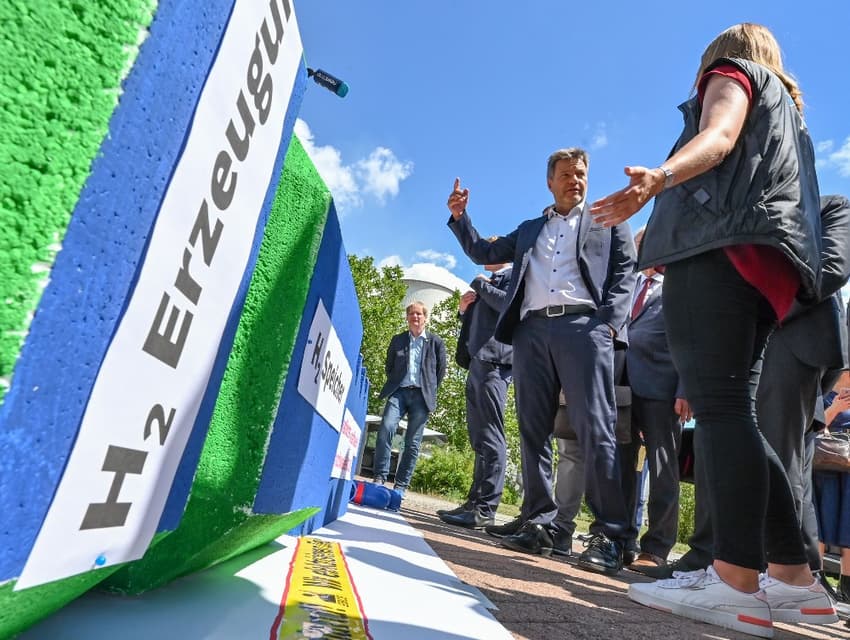Germany hails 'progress' in EU talks on hydrogen plants

German Economy Minister Robert Habeck on Tuesday welcomed "important progress" in talks with the European Commission on the conditions for state aid for hydrogen power plants.
Berlin, which aims to source the country's electricity almost entirely from renewable energy by 2035, sees hydrogen playing a key role in the shift away from fossil fuels.
Habeck, describing the discussions with Brussels as "intensive", said an understanding had been reached on the legal framework for planned tenders for the plants.
"We achieved important progress," he said in a statement.
The economy ministry, in the same statement, stressed there was no approval yet from Brussels regarding national state aid for the hydrogen plans.
But the talks had set out "the guard rails within which the state subsidy programs must operate in order to comply with the state aid and energy legislation at European level", the ministry said.
READ ALSO: Whistle blows in Germany for world's first hydrogen train fleet
Hydrogen: zero-emission energy carrier
The ministry will finalise its power plant strategy over the summer before launching a consultation phase with relevant stakeholders.
"A climate-neutral power sector is the backbone of decarbonisation of the other sectors, because all other sectors will use more electricity in the future than they do today," Habeck said.
Germany aims to get most of its clean energy from wind and solar power in the future.
But in times of little wind or sunshine, "controllable power plants" such as those running on climate-neutral hydrogen will be needed to make up the shortfall, Habeck said.
Berlin wants to tender 8.8 gigawatts of new plants that will run on hydrogen from the start, Habeck said.
The government also plans to tender another 15 gigawatts of power plants that will temporarily run on natural gas until they are connected to the hydrogen grid, by 2035 at the latest.
But the issue of subsidies for power plants has proved thorny in talks between the European Commission and Berlin.
Germany wants subsidies for future plants to be included in the EU's decarbonisation plans, which would guarantee faster approval and larger sums, magazine Der Spiegel reported in July.
But the Commission reportedly believes this would be problematic if it also covers plants running on climate-damaging gas, meaning only hydrogen plants could qualify for subsidies.
Hydrogen is a zero-emission energy carrier when it is made using renewable electricity.
So-called green hydrogen is produced by passing an electric current through water to split it between hydrogen and oxygen, a process known as electrolysis. It is considered green because the electricity comes from renewable sources of energy that don't create harmful emissions.
When burned, hydrogen only emits harmless water vapour.
READ ALSO: Germany aims for 'world number one spot' in green hydrogen
Comments
See Also
Berlin, which aims to source the country's electricity almost entirely from renewable energy by 2035, sees hydrogen playing a key role in the shift away from fossil fuels.
Habeck, describing the discussions with Brussels as "intensive", said an understanding had been reached on the legal framework for planned tenders for the plants.
"We achieved important progress," he said in a statement.
The economy ministry, in the same statement, stressed there was no approval yet from Brussels regarding national state aid for the hydrogen plans.
But the talks had set out "the guard rails within which the state subsidy programs must operate in order to comply with the state aid and energy legislation at European level", the ministry said.
READ ALSO: Whistle blows in Germany for world's first hydrogen train fleet
Hydrogen: zero-emission energy carrier
The ministry will finalise its power plant strategy over the summer before launching a consultation phase with relevant stakeholders.
"A climate-neutral power sector is the backbone of decarbonisation of the other sectors, because all other sectors will use more electricity in the future than they do today," Habeck said.
Germany aims to get most of its clean energy from wind and solar power in the future.
But in times of little wind or sunshine, "controllable power plants" such as those running on climate-neutral hydrogen will be needed to make up the shortfall, Habeck said.
Berlin wants to tender 8.8 gigawatts of new plants that will run on hydrogen from the start, Habeck said.
The government also plans to tender another 15 gigawatts of power plants that will temporarily run on natural gas until they are connected to the hydrogen grid, by 2035 at the latest.
But the issue of subsidies for power plants has proved thorny in talks between the European Commission and Berlin.
Germany wants subsidies for future plants to be included in the EU's decarbonisation plans, which would guarantee faster approval and larger sums, magazine Der Spiegel reported in July.
But the Commission reportedly believes this would be problematic if it also covers plants running on climate-damaging gas, meaning only hydrogen plants could qualify for subsidies.
Hydrogen is a zero-emission energy carrier when it is made using renewable electricity.
So-called green hydrogen is produced by passing an electric current through water to split it between hydrogen and oxygen, a process known as electrolysis. It is considered green because the electricity comes from renewable sources of energy that don't create harmful emissions.
When burned, hydrogen only emits harmless water vapour.
READ ALSO: Germany aims for 'world number one spot' in green hydrogen
Join the conversation in our comments section below. Share your own views and experience and if you have a question or suggestion for our journalists then email us at [email protected].
Please keep comments civil, constructive and on topic – and make sure to read our terms of use before getting involved.
Please log in here to leave a comment.